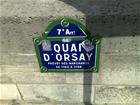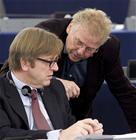The "Arab Tienanmen" caused sharp criticism in the European Parliament
Adelina Marini, May 12, 2011
 "The events in Syria are the Arab Tienanmen"; "Europe continues to be a dwarf despite the ever growing expectations of the European public opinion"; "There are governments that hamper the single foreign policy of the EU". This are only a part of the statements in the same spirit of MEPs during the debate in the European Parliament on foreign, security and defence policy on May 10 with the participation of Community's High Representative for Foreign Affairs Lady Catherine Ashton. The sharp reactions against some particular member states that prevent EU's foreign policy from becoming strong and most of all - common - were caused by Lady Ashton's speech in the beginning of the debate.
"The events in Syria are the Arab Tienanmen"; "Europe continues to be a dwarf despite the ever growing expectations of the European public opinion"; "There are governments that hamper the single foreign policy of the EU". This are only a part of the statements in the same spirit of MEPs during the debate in the European Parliament on foreign, security and defence policy on May 10 with the participation of Community's High Representative for Foreign Affairs Lady Catherine Ashton. The sharp reactions against some particular member states that prevent EU's foreign policy from becoming strong and most of all - common - were caused by Lady Ashton's speech in the beginning of the debate.
In her speech she outlined the main challenges the European Union is facing because of the events in the South Mediterranean and the Middle East and underlined: "Europe has choices to make, too. As we look at our neighbourhood, we have to be ready to rise to the challenges that are being asked of us. I can make  hundreds of statements - and I do. I deplore, condemn, urge, demand - but we also need to act. And that action has to come in different forms".
hundreds of statements - and I do. I deplore, condemn, urge, demand - but we also need to act. And that action has to come in different forms".
According to Lady Ashton, aside from the challenges, the situation in Europe's neighbourhood also presents opportunities which "Europe cannot afford to miss". She recalled that democracy takes time to take deep roots, because it was not only elections and changing governments. "What we in Europe have learned the hard way is that we need “deep democracy”: respect for the rule of law, freedom of speech, respect for human rights, an independent judiciary and impartial administration. It [democracy] requires enforceable property rights and free trade unions. It is not just about changing governments, but about building the right institutions and the right attitudes".
The words of EU's HR for foreign policy resonate very much these days as for the countries in North Africa and the Middle East but also for the new member states of the European Union, as well as for the countries that are at the eastern borders of the Union. Ms Ashton emphasized on the efforts Europe needed to invest in order to help the turbulent countries to stabilise their economies and make them grow, because otherwise they would always be a source of trouble for Europe.
Although she was welcomed in the very beginning of her mandate with severe criticism precisely by the European Parliament, on May 11 she received strong support by almost all big political groups in Parliament. In spite of the criticism, the main message was that unless member states allow it, Europe would never be strong at the political arena. With similar words started Joseph Daul, leader of the biggest group in Parliament - the European People's Party. According to him, Europe still is a dwarf politically and a giant economically. More needs to be done and lessons to be drawn from the crisis in EU's neighbourhood. In conclusion Mr Daul quoted the late pope John Paul II by saying: "Do not be afraid, Lady Ashton".
 Martin Schulz, the leader of the Progressive Alliance of Socialists and Democrats (PASD), said that there were governments in the EU that did not want a strong foreign policy. "In the European Parliament we are asking a different question - what is the role of the Union as a body within international politics"? Mr Schulz admitted that he often read articles lately that criticised the HR for the lack of a strong foreign policy, "which is criticism inspired by people who are only thinking about their own national foreign policies and their are giving primacy of that. That doesn't unify Europe but fragments it". Moreover, the German MEP said, there was a tendency in several capitals foreign and
Martin Schulz, the leader of the Progressive Alliance of Socialists and Democrats (PASD), said that there were governments in the EU that did not want a strong foreign policy. "In the European Parliament we are asking a different question - what is the role of the Union as a body within international politics"? Mr Schulz admitted that he often read articles lately that criticised the HR for the lack of a strong foreign policy, "which is criticism inspired by people who are only thinking about their own national foreign policies and their are giving primacy of that. That doesn't unify Europe but fragments it". Moreover, the German MEP said, there was a tendency in several capitals foreign and  security policy to be considered as a natural prolongation of their national policies. He called by name several of them, including the French diplomacy.
security policy to be considered as a natural prolongation of their national policies. He called by name several of them, including the French diplomacy.
Not less vehemently spoke the leader of the Alliance of Liberals and Democrats for Europe (ALDE), Guy Verhofstadt, who criticised the European Commission for dealing with planning a reform of the Neighbourhood Policy, which will be applied in the years to come, instead of helping countries that urgently need money. He named Egypt, where the budget was to be depleted before the year-end and unless the country received urgently financial aid, new uprising could follow. It was him who called the events in Syria the "Arab Tienanmen" and pointed out: "800 people killed today, 8,000 people arrested today. Make a travel ban to the whole Assad family, not only  against 13 people. You have to strengthen sanctions. You can help to stop this Arab Tienanmen", said the former Belgian prime minister, literally shouting, exceeding his statement time.
against 13 people. You have to strengthen sanctions. You can help to stop this Arab Tienanmen", said the former Belgian prime minister, literally shouting, exceeding his statement time.
The co-president of the group of the Greens and the European Free Alliance, Daniel Kohn-Bendit, asked Ms Ashton to name the member states that voted against including in the ban list the entire family of Bashar al-Assad. According to him, the problem of Syria can be solved only when Assad leaves. He several times reiterated that he wanted to know who prevented the unanimity of the Union and hinted that this could be German Foreign Minister Guido Westerwelle.
Lady Ashton explained that only 13 people were included in the ban list because only they were directly involved in the repressions in the country. She, however, said that she could not provide a list of names of the countries that voted against Assad's family to be included in the list as the talks were heated and there were various opinions for or against. "I assure you that we will put maximum political pressure on Syria. They understand the significance of what we're doing", she assured the MEPs.
The debate in the European Parliament, as well as the events around Europe in the past months showed clearly once again that for the ten years of writing of a new treaty, that ended up with the entry into force of the Lisbon Treaty on December 1 2009, the European Union emerged formally with a single voice but not with a single policy. Something, which, against the backdrop of the dividing problems within the Union - like Schengen, the economic governance and the bailouts of troubled countries in the euro area - for many countries probably this seems pretty enough. And it would not be too much to say that the European integration, which completed 61 years on May 9th, is facing one of its most serious challenges so far.